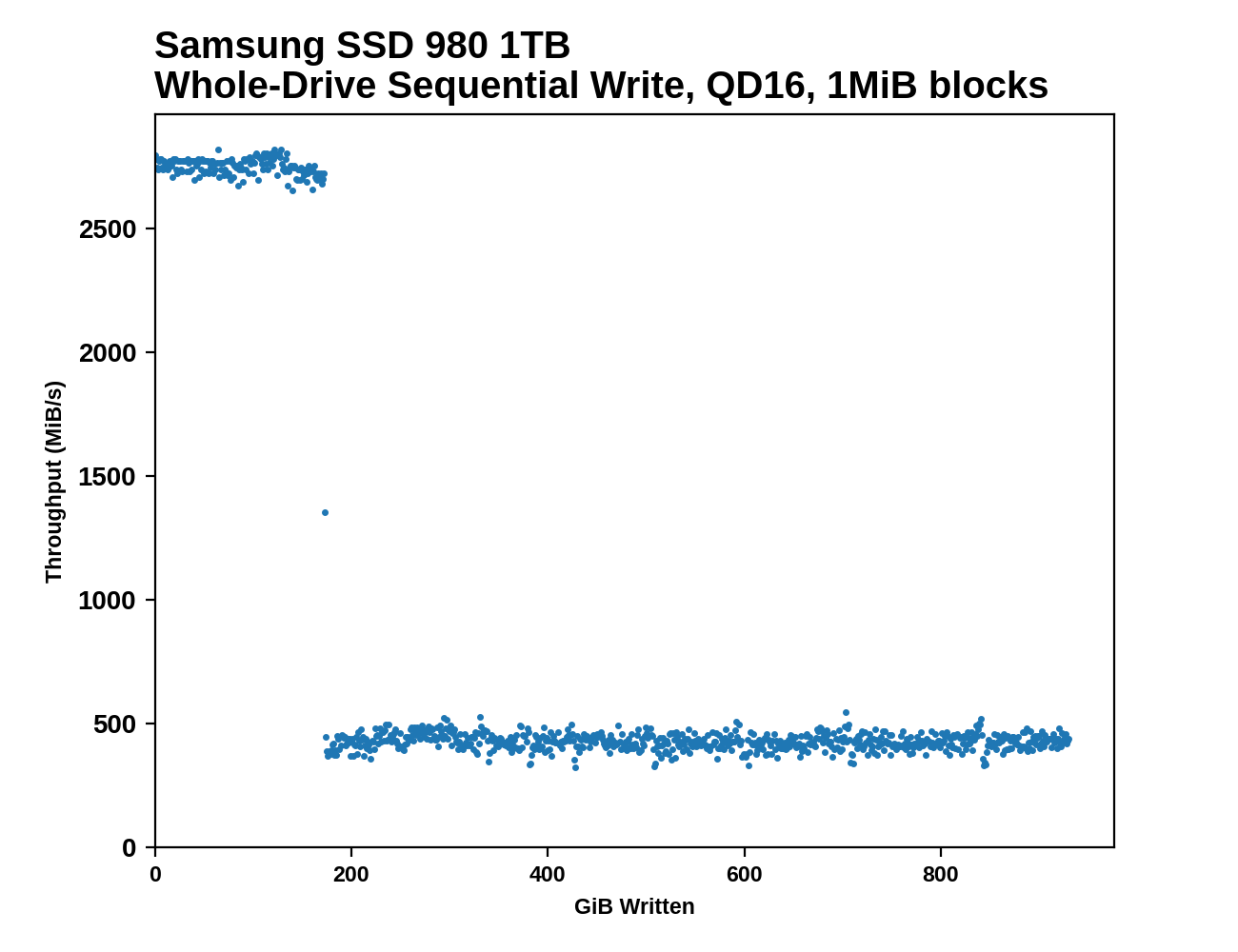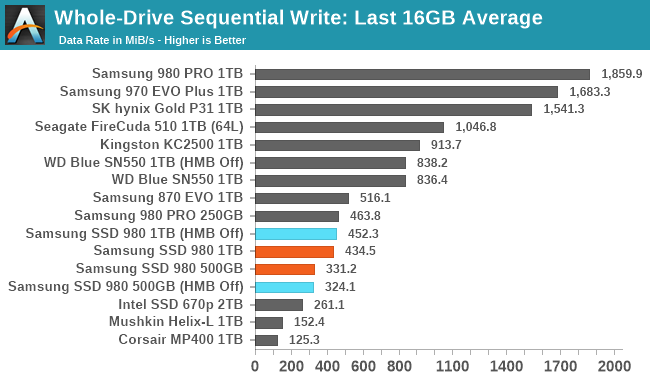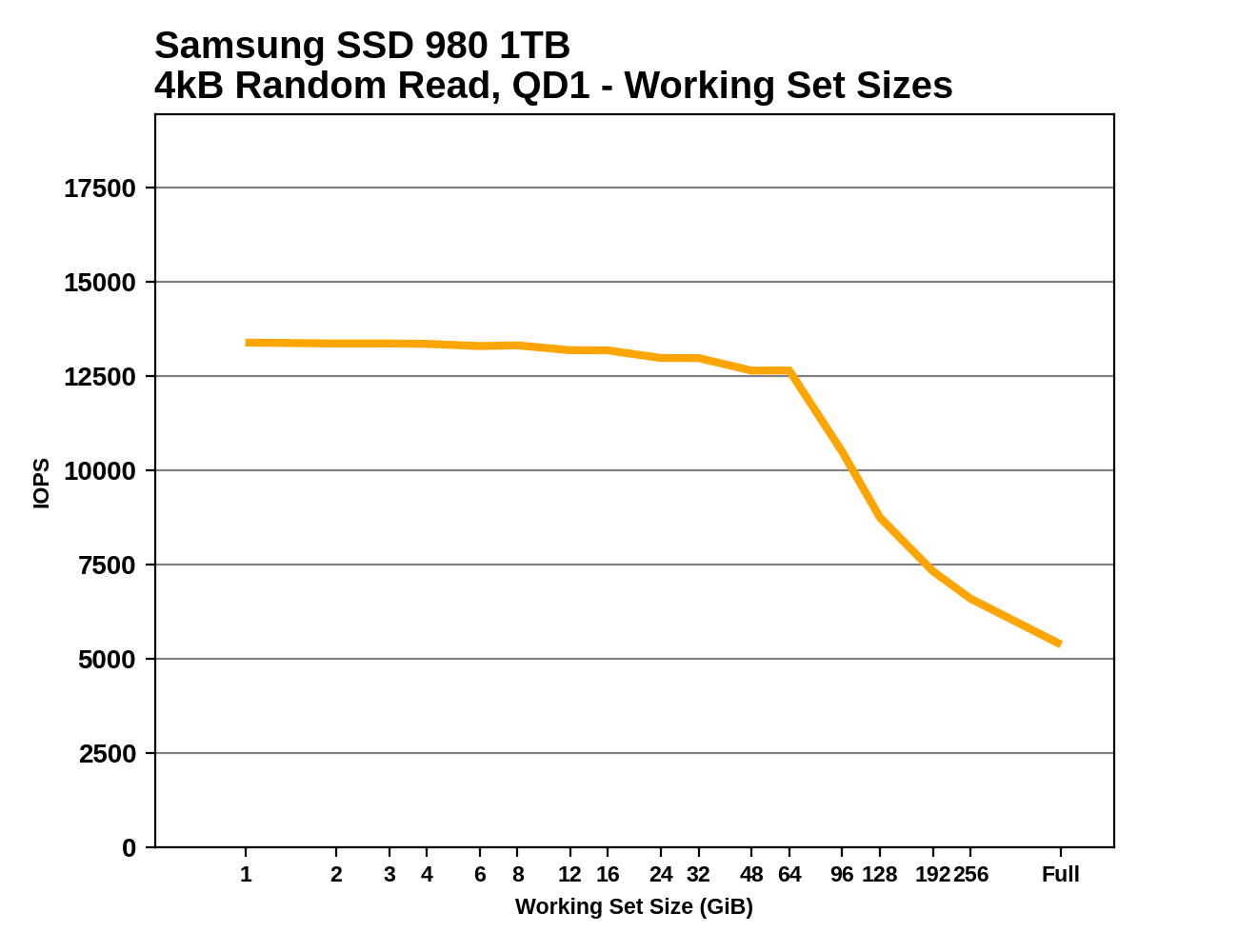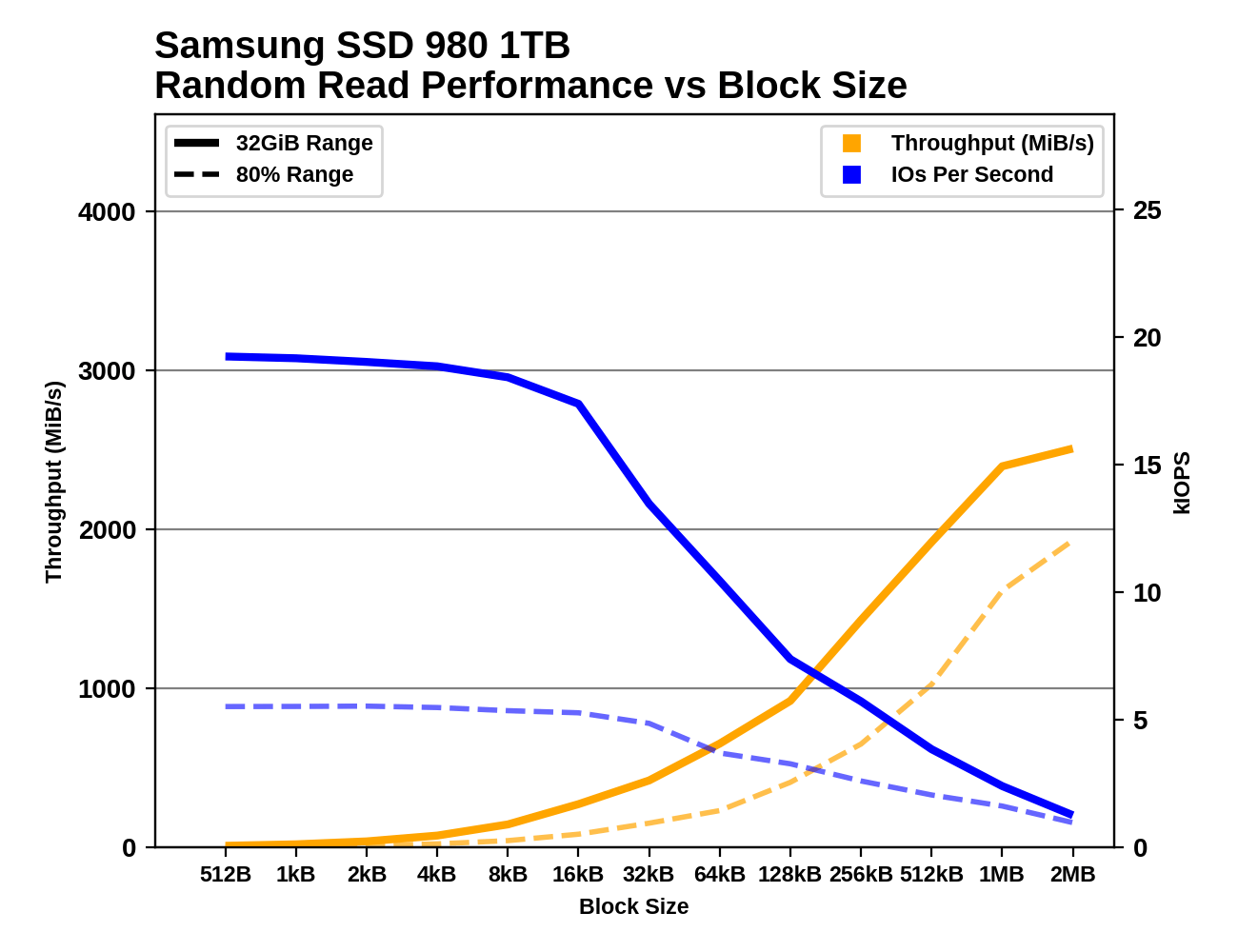The Samsung SSD 980 (500GB & 1TB) Review: Samsung's Entry NVMe
by Billy Tallis on March 9, 2021 10:00 AM ESTAdvanced Synthetic Tests
Our benchmark suite includes a variety of tests that are less about replicating any real-world IO patterns, and more about exposing the inner workings of a drive with narrowly-focused tests. Many of these tests will show exaggerated differences between drives, and for the most part that should not be taken as a sign that one drive will be drastically faster for real-world usage. These tests are about satisfying curiosity, and are not good measures of overall drive performance. For more details, please see the overview of our 2021 Consumer SSD Benchmark Suite.
Whole-Drive Fill
 |
|||||||||
| Pass 1 | |||||||||
| Pass 2 | |||||||||
The Samsung SSD 980 clearly has larger SLC caches than the 970 EVO Plus or 980 PRO, as advertised. But post-cache performance is about a third that of the 970 EVO Plus when comparing the 1TB models, and the 500GB 980 is even slower post-cache. The apparent cache sizes are about 100GB for the 500GB model and 173GB for the 1TB model: a bit larger than advertised for the 1TB and a bit smaller than advertised for the 500 GB. On the second pass of filling the drives, the 1TB 980 never gets back up to full SLC cache speed, and the 500GB model only does for about 5GB. Samsung didn't give specs for the minimum SLC cache size, but it's clear there's not much left when the 980 is full.
 |
|||||||||
| Average Throughput for last 16 GB | Overall Average Throughput | ||||||||
The 1TB SSD 980's performance on the whole-drive fill averages out to just a hair slower than the 1TB 870 EVO, and the 500GB model is about 25% slower than that. It's clear that both the narrower 4-channel controller and the lack of DRAM are both contributing to the lower write throughput of the SSD 980 as compared with Samsung's high-end NVMe drives.
Working Set Size
 |
|||||||||
The 64MB Host Memory Buffer used by the SSD 980 is very clearly illustrated by this test. Without HMB enabled, the 980's random read performance suffers even for small working set sizes of just a few GB, indicating there's very little on-controller RAM. For extremely large working set sizes, the 980's performance drops below the SATA 870 EVO.
The WD Blue SN550 shows slightly worse random read performance than the SSD 980 for smaller working set sizes, and its smaller HMB allocation means performance starts dropping sooner. But at large working set sizes or with HMB off, the SN550 retains more performance, and the SN550 seems to have more on-chip RAM for use when HMB is unavailable.
Performance vs Block Size
 |
|||||||||
| Random Read | |||||||||
| Random Write | |||||||||
| Sequential Read | |||||||||
| Sequential Write | |||||||||
The Samsung SSD 980 maintains high random read IOPS up to block sizes of 16kB, and throughput starts to saturate once the block size is up to about 1MB. For random writes, IOPS starts dropping after 4kB, or after just 2kB when the test is hitting 80% of the drive. With HMB off, the 980 shows a clear preference for 4kB block size for random writes. Sequential reads show odd behavior for block sizes from 32kB to 128kB, with performance stalling then regressing despite increased block size. This happens for both capacities, with or without HMB, so it's a systemic quirk—and an unfortunate one, since 128kB is the usual block size for sequential IO benchmarks. For sequential writes the SSD 980 is well-behaved with smooth scaling of throughput as block sizes increase. Neither capacity of the SSD 980 runs into SLC cache size limits during these tests.
By contrast, the WD Blue SN550 shows much stronger signs of optimization specifically for 4kB block sizes: the effect is small for random reads but huge for random or sequential writes. Sub-4kB accesses are a generally not worth the trouble on the SN550. This drive also appears to occasionally run out of SLC cache during the random write block size testing.










54 Comments
View All Comments
XacTactX - Tuesday, March 9, 2021 - link
Next time I have to proof read. The performance is very good but it drops off when the drive is full of dataDigitalFreak - Tuesday, March 9, 2021 - link
@Billy All those names are related to space. Polaris and Photon are obvious. Phoenix was a Mars robot. Elpis was the Greek spirit of hope, but is also an asteroid. Maru = Kobayashi Maru? Pablo = Pablo Gabriel de León?Maybe someone at Samsung is good with obscure facts :-)
Tomatotech - Tuesday, March 9, 2021 - link
An OK-ish drive especially if it comes down slightly to a better price. Middle of the pack on everything, which is excellent for an entry level drive.The one thing I really don't like is the name. The Samsung 980 Pro is one of the best NVME drives ever made. This is ... not. The internet is full of praise for the Samsung 980, often without specifying the 'Pro' because there's been only one model. How many people are going to see that praise, whether it says 'Pro' or not, and assume it's referring to this drive?
This feels like a sneaky misleading cash-grab by Samsung Marketing for the sake of allowing PC adverts to plaster 'Contains Samsung 980 SSD!' on them.
To be honest the entry-level 980 doesn't deserve this, it's a decent drive that doesn't need cheating to promote it. If it was labelled 'Samsung SSD 975' that would be perfectly fine.
Oxford Guy - Tuesday, March 9, 2021 - link
Samsung is a particularly slimy company. First, there were the fantasy power claims for the 830 drives, claims people took at face value to promote them in forums. (Samsung, I also recall, was caught paying people to astroturf in forums.) Anandtech's power tests showed that the 830 drives used a lot more power.Then, when the planar 840 drives were exposed as being a faulty design, the company refused to replace the drives. Instead, it issued a kludgy work-around — causing the drive to re-write data as many times as necessary to continue to work around the problem (voltage drift from planar TLC I assume). The steady state performance of the 128 GB 840 was so bad HardOCP said it had worse performance than a laptop hard disk, at least in some areas.
Then, we have the company's decision to use (unfortunately legal, probably) fraud, labeling TLC and QLC drives 'MLC' — as an intentional bait and switch since the industry standard for naming has been MLC for 2 layer flash for many years — many years before Samsung started cheating with the naming. Calling QLC drives MLC is so egregious it shouldn't be legal.
Now, we have what you pointed out. Samsung loves to trick people with naming lately. Making up power consumption figures is old school, apparently.
It's anecdotal, but someone in my family bought a 1 TB 860 QLC and it has never been reliable. It even causes the entire machine to slow and have booting problems. The Inland NVME TLC drive I had him replace the Samsung with doesn't have those issues nor does the Inland TLC SATA drive that has been in the machine from the start. He did an RMA and the replacement (which probably was the original drive) had the same problem.
Oxford Guy - Tuesday, March 9, 2021 - link
Also, it's unacceptable to sell expensive televisions with undefeatable ads. That other companies do it also is no excuse.UltraTech79 - Monday, March 29, 2021 - link
Dude this naming scheme has been around for a decade. If someone is too stupid to see PRO thats on them, not Samsung.Samus - Tuesday, March 9, 2021 - link
I know this is anecdotal but I can't help but mention the third Samsung SSD in as many months sitting on my bench that failed right out of its 5-year warranty, in this case an 850 EVO. Randomly drops off the bus. These drives have serious longevity concerns and it seems to be a firmware\controller issue, as every drive uses the MEX controller (the 840's and the 850 EVO 1TB) and while I realize that controller hasn't been used in recent products, it's astonishing coincidence they are failing out of warranty obviously doesn't result in repeat customers for Samsung.Meanwhile every Crucial drive I've seen in the last decade from the C300, M4, M500\550, MX and BX series have reliability beyond Crucial's metrics and I'm talking at least 200 installed drives throughout our company.
DigitalFreak - Tuesday, March 9, 2021 - link
Both of my 860 EVOs (500GB & 4TB) have been solid. I agree that their pre-860 series drives were not that great.Samus - Tuesday, March 9, 2021 - link
I agree the newer drives seem reliable, yet the 840 Pro and 850's seemed reliable for the longest time too while recently reports across the web have shown them beginning to fail in the last few years, and Samsung has the most annoying, anti-customer tech support in the industry. Their storage support is outsourced to a 3rd party (storage tech solutions) and with ridiculous warranty qualifications (good luck finding that proof of purchase from 4 years ago) and weeks-long turnarounds. Meanwhile Intel, Toshiba\OCZ and presumably Crucial (we've never had to RMA a Crucial SSD, and most are Micron OEM drives anyway) have fairly normal RMA process from what I've heard. My experience RMA'ing a Intel SSD730 was met with a replacement of a larger capacity 545s and my experience RMA'ing a OCZ ARC100 was met with a free ADVANCED replacement of a same capacity Trion 150. The one Samsung SSD I replaced a few years ago (3 months before the warranty was set to expire) was an 840 EVO and they replaced it with AN 840 EVO. We all know the 840 EVO is one of the worst, if not the worst, SSD Samsung has ever made, you'd think they want to cycle them out of existence yet they seemingly have a stockpile of them somewhere to offload to customers and have them fail again from their write amplification issues.I realize my experience is mostly anecdotal but there are plenty of references to customers with Samsung failures, and like Apple, it's hard to actually find negative reviews due to blind loyalty, and the fact the majority of Samsung's SSD business is (was) in OEM's so customers likely didn't even know the failures were Samsung-related in the systems that failed. Probably explains why Toshiba and Hynix, along with the OEM regulars Intel and Micron have erroded their OEM wins and you see fewer and fewer Samsung SSD's in modern PC's. Admittedly this can be attributed to Samsung's premium pricing over every other competitor in an industry plagued with tiny margins.
Tomatotech - Tuesday, March 9, 2021 - link
Interesting reports. I've installed rather a lot of Samsung 2.5" SATA SSDs (various models, purchased used for cheap) for various charities and non-profits and never had any fail yet. Had an inherited Kingston 480GB SATA 2.5" fail - they sent me a replacement. A 1TB Crucial P1 NVMe m.2 (purchased new) started giving problems in one of my Macbook Airs - freezing and crashes - had to move it to my PC desktop where it's worked fine ever since.My main m.2 are a pair of ADATA XPG SX8200 1TB nvme, also purchased used, which have given magnificent service in everything I've put them in - PCs and Apple Airs and MacBooks Pro.